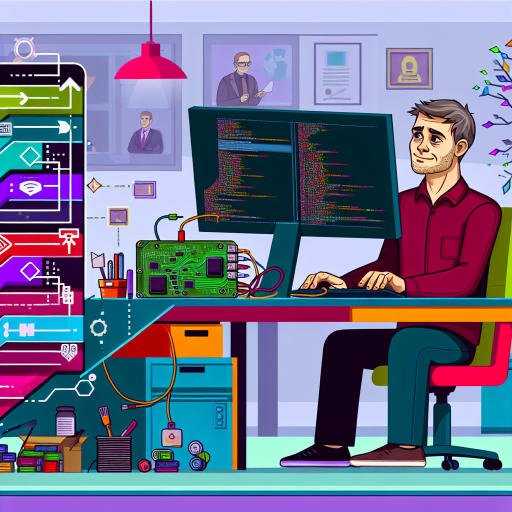Introduction:
A DevOps Engineer is responsible for the collaboration between development and operations teams to automate and speed up the delivery of software.
On the other hand, a Software Engineer focuses on designing, developing, and testing software applications.
Importance of Understanding the Key Differences:
It is crucial to understand the key differences between a DevOps Engineer and a Software Engineer to effectively allocate resources and responsibilities within a team.
Knowing these distinctions can help organizations streamline their development process and optimize efficiency.
Job Responsibilities:
DevOps Engineer: focus on collaboration between development and operations teams, automation of processes, continuous integration and deployment.
Software Engineer: primarily responsible for designing, developing, and testing software applications.
DevOps Engineer
DevOps Engineers are responsible for bridging the gap between software development and IT operations.
Their main focus is on automating processes, ensuring smooth collaboration between different teams, and implementing continuous integration and deployment practices.
One of the key responsibilities of a DevOps Engineer is to streamline the software development lifecycle by automating tasks such as code deployment, testing, and monitoring.
They work closely with developers and operations teams to ensure that the code is released efficiently and with minimal downtime.
DevOps Engineers also play a crucial role in implementing DevOps best practices within an organization.
This includes setting up continuous integration and deployment pipelines, monitoring system performance, and ensuring high availability of applications.
Overall, DevOps Engineers focus on improving the speed, quality, and reliability of software development and deployment processes through automation, collaboration, and continuous improvement.
Software Engineer
Software Engineers are primarily responsible for designing, developing, and testing software applications.
They work on creating the codebase for applications based on design specifications and requirements provided by stakeholders.
Software Engineers are involved in all stages of the software development lifecycle, from initial design and implementation to testing and deployment.
They write clean, efficient code that meets project objectives and adheres to coding standards.
One of the main tasks of a Software Engineer is to collaborate with other team members, such as designers, product managers, and quality assurance testers, to ensure that the software meets all requirements and functions as intended.
Software Engineers also need to stay updated on the latest tools, technologies, and programming languages to continuously improve their skills and deliver high-quality software solutions.
Software Engineers focus on the technical aspects of software development, working to create functional and efficient applications that meet user needs and business requirements.
Transform Your Career Today
Unlock a personalized career strategy that drives real results. Get tailored advice and a roadmap designed just for you.
Start NowSkill Set:
When it comes to comparing DevOps engineers and software engineers based on their skill sets, there are distinct differences that set them apart.
DevOps Engineer:
- Strong technical skills in automation tools
- Proficiency in scripting languages
- Experience with cloud services
- Knowledge of infrastructure management
DevOps engineers are responsible for bridging the gap between development and operations teams by automating processes, managing infrastructure, and ensuring smooth deployment and delivery of software solutions.
Software Engineer:
- Proficiency in programming languages
- Familiarity with software development methodologies
- Excellent problem-solving skills
Software engineers focus on designing, developing, and testing software applications using various programming languages and tools.
They are adept at problem-solving and creating efficient solutions to complex problems.
While both roles require strong technical skills, the specific skill sets needed for DevOps engineers and software engineers differ due to the nature of their roles and responsibilities within an organization.
See Related Content: Effective Risk Assessment in IT Vendor Management
Team Dynamics:
In the realm of team dynamics, DevOps engineers and software engineers have distinct roles and responsibilities.
DevOps engineers are known for their ability to bridge the gap between development and operations teams.
They work closely with both departments to streamline processes, enhance communication, and improve overall efficiency.
By understanding the needs and goals of both sides, DevOps engineers can implement solutions that benefit the entire software development lifecycle.
On the other hand, software engineers typically collaborate with other software engineers, designers, and project managers.
They work together to design, develop, and maintain software applications.
This collaborative effort is essential in ensuring that software projects are completed successfully and meet the requirements of end-users.
While both DevOps engineers and software engineers work within team environments, the nature of their collaborations differs.
DevOps engineers focus on improving the overall software development process by implementing automation, continuous integration, and deployment practices.
This requires close coordination with development and operations teams to ensure that changes are seamlessly integrated into the software delivery pipeline.
Software engineers, on the other hand, work closely with other technical professionals to design, code, test, and deploy software applications.
Their collaboration extends beyond technical aspects and includes working with designers to create user-friendly interfaces.
They also collaborate with project managers to meet deadlines and milestones effectively.
DevOps engineers and software engineers both play crucial roles in the software development process.
Transform Your Career Today
Unlock a personalized career strategy that drives real results. Get tailored advice and a roadmap designed just for you.
Start NowWhile DevOps engineers focus on streamlining processes and improving efficiency across teams, software engineers collaborate with other technical professionals.
They create and maintain software applications that meet the needs of end-users.
Despite their differences, both roles are essential in delivering high-quality software products that drive business success.
- DevOps Engineer: works closely with both development and operations teams to streamline processes and improve efficiency.
- Software Engineer: typically collaborates with other software engineers, designers, and project managers to create and maintain software applications.
Delve into the Subject: Tech Evangelist’s Role in Product Feedback and Improvement
Development Lifecycle:
- DevOps Engineer: involved in all stages of the development process, from planning and coding to testing and deployment.
- Software Engineer: focus is primarily on writing code and ensuring the functionality of the software application.
DevOps Engineers play a crucial role in software development by being involved in every step of the development lifecycle.
From the initial planning stages, they collaborate with stakeholders to understand requirements.
In addition, they write code and implement new features.
DevOps Engineers work closely with cross-functional teams to ensure a seamless and efficient development process.
They are responsible for automating processes, managing infrastructure, and incorporating feedback from testing and deployment phases.
By being present in all stages of development, DevOps Engineers help streamline the entire process.
This involvement ensures that the final product meets quality standards.
In contrast, Software Engineers focus primarily on writing code and ensuring the functionality of the software application.
They have a specialized role, with a deep focus on coding, debugging, and implementing software solutions based on specifications.
Software Engineers collaborate with team members, such as product managers and designers, to turn requirements into functional products.
They are responsible for writing clean, maintainable code, conducting testing to identify and fix bugs, and optimizing software performance.
While they may collaborate with DevOps Engineers during deployment, their main focus remains on the coding aspect of software development.
You Might Also Like: IT Compliance Analyst: Pros and Cons of the Role
Tools and Technologies:
– DevOps Engineer: utilizes tools such as Jenkins, Docker, Kubernetes, Ansible for automation and deployment.
– Software Engineer: uses programming languages like Java, Python, C++, and development frameworks like Angular, React, Node.js.
In the realm of DevOps, tools and technologies play a crucial role in enabling efficient collaboration and automation processes within the software development lifecycle.
Transform Your Career Today
Unlock a personalized career strategy that drives real results. Get tailored advice and a roadmap designed just for you.
Start NowLet’s explore the key tools and technologies that DevOps Engineers and Software Engineers commonly use:
DevOps Engineer:
- Jenkins: DevOps Engineers often rely on Jenkins for continuous integration and continuous deployment (CI/CD) pipelines. Jenkins helps automate the building, testing, and deployment of software.
- Docker: Docker is a popular containerization platform used by DevOps Engineers to create, deploy, and run applications in isolated containers. It simplifies the process of packaging software.
- Kubernetes: DevOps Engineers leverage Kubernetes for container orchestration. Kubernetes automates the deployment, scaling, and management of containerized applications, ensuring high availability and scalability.
- Ansible: Ansible is a powerful automation tool used by DevOps Engineers for configuration management, application deployment, and task automation. It allows for seamless automation of IT infrastructure.
Software Engineer:
- Programming Languages: Software Engineers are proficient in programming languages like Java, Python, and C++. They use these languages to write code and develop software applications.
- Development Frameworks: Software Engineers often work with development frameworks such as Angular, React, and Node.js. These frameworks provide a structured foundation for building web and mobile applications.
While DevOps Engineers focus on automation and deployment tools like Jenkins, Docker, Kubernetes, and Ansible, Software Engineers primarily work with programming languages and development frameworks to create robust and scalable software solutions.
Both roles require a deep understanding of tools and technologies to streamline the software development process effectively.
Discover More: Best Practices for Data Encryption and Protection

Comparison of DevOps Engineers and Software Engineers
When comparing DevOps Engineers and Software Engineers, one key aspect to consider is their goal orientation.
DevOps Engineer:
- Aims to improve collaboration, efficiency, and reliability of software development and deployment processes.
Software Engineer:
- Focused on creating high-quality, functional software applications that meet client requirements.
While both roles involve working with software, their ultimate objectives and priorities differ significantly.
DevOps Engineers prioritize streamlining the development and deployment processes to enhance communication and coordination among different teams.
Their main focus is on facilitating continuous integration and continuous deployment (CI/CD) practices to improve efficiency and reliability in software delivery.
On the other hand, Software Engineers are primarily concerned with designing, developing, and testing software applications that meet the specific requirements and demands of clients or end-users.
They are responsible for creating robust, user-friendly, and high-performance software solutions that align with the business objectives of the organization.
While the ultimate goal of both DevOps and Software Engineers is to deliver quality software solutions, their approaches and areas of expertise may vary.
DevOps Engineers emphasize collaboration, automation, and process improvement, while Software Engineers focus on coding, testing, and software architecture to meet user needs.
Understanding these distinctions can help organizations effectively leverage the unique skills and strengths of both DevOps and Software Engineers.
This approach optimizes software development and deployment processes for maximum efficiency and success.
Continuous Learning:
Continuous learning is an essential aspect of both DevOps engineers and software engineers.
In this rapidly evolving field of technology, staying updated with the latest tools and practices is crucial for professional growth and efficiency in workflow.
DevOps Engineer:
- DevOps engineers are responsible for automating processes, managing infrastructure, and ensuring continuous integration and deployment pipelines.
- To excel in their role, DevOps engineers need to constantly update their knowledge on automation tools such as Ansible, Puppet, Chef, and Jenkins.
- Moreover, staying abreast of cloud technologies like AWS, Azure, and Google Cloud Platform is essential for DevOps engineers to optimize their infrastructure.
- Keeping up with best practices in DevOps, such as code versioning, monitoring, and security protocols, is also crucial for DevOps engineers to ensure successful project delivery.
- Continuous learning in these areas allows DevOps engineers to streamline processes, improve efficiency, and enhance collaboration between development and operations teams.
Software Engineer:
- Software engineers focus on designing, developing, and implementing software applications using programming languages and development frameworks.
- As technology evolves, software engineers must continuously learn new programming languages to adapt to changing requirements and trends in the industry.
- Staying current on popular development frameworks like Angular, React, and Node.js is essential for software engineers to build modern and efficient applications.
- Software engineers also need to stay updated on software trends such as microservices architecture, containerization, and serverless computing to remain competitive in the market.
- Continuous learning in these areas enables software engineers to deliver high-quality, scalable, and innovative solutions to meet the demands of end-users and businesses.
Key Differences Between DevOps and Software Engineers
DevOps Engineers focus on continuous integration, deployment, and monitoring of software systems.
Software Engineers work on the coding and development of software applications.
These roles are not mutually exclusive; they are complementary.
DevOps Engineers collaborate with Software Engineers to streamline the software development lifecycle.
Transform Your Career Today
Unlock a personalized career strategy that drives real results. Get tailored advice and a roadmap designed just for you.
Start NowThis collaboration ensures that code is efficiently deployed and managed in production environments.
Additional Resources
What you give up when moving into engineering management …
Why would you choose devops over dev or software engineer as …




